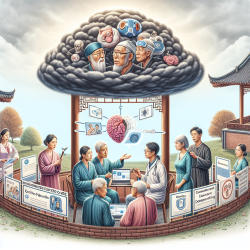Introduction
In the realm of healthcare, shared decision-making (SDM) has emerged as a pivotal model that bridges the gap between clinicians and patients. It allows for a collaborative approach to treatment, taking into account both the clinical expertise of healthcare professionals and the personal values and preferences of patients. However, cultural factors can significantly influence the efficacy of SDM, as highlighted in the research article "Confucian Familism and Shared Decision Making in End-of-Life Care for Patients with Advanced Cancers" by Yang et al. (2022).
Understanding the Study
The study delves into the cultural dynamics of Confucian familism in China and its impact on SDM in end-of-life (EOL) care for advanced cancer patients. Confucian familism emphasizes collective family decision-making, often sidelining the patient's autonomy. The research involved 164 patients and utilized the SDM-Q-9 tool to measure SDM levels. The findings revealed a mean SDM score of 38/100, with nearly half of the patients being unfamiliar with their treatment plans.
Key Findings and Implications
Several critical insights emerged from the study:
- Confucian Familism: The study found that the presence of more siblings, a proxy for Confucian familism, correlated with lower SDM levels. This suggests that family involvement often overrides patient-clinician collaboration.
- Age and Openness: Older patients (56-65 years) and those open to new experiences exhibited higher SDM scores. This highlights the importance of considering patient demographics and personality traits in fostering SDM.
- Satisfaction Paradox: Interestingly, higher satisfaction with EOL care was associated with lower SDM, indicating that satisfied patients might defer more to their clinicians, reducing their active participation in decision-making.
Practical Applications for Practitioners
For practitioners, understanding these dynamics is crucial in tailoring their approach to different cultural contexts. Here are some strategies to enhance SDM in culturally diverse settings:
- Cultural Sensitivity Training: Equip practitioners with cultural competence skills to navigate family dynamics and encourage patient autonomy.
- Patient Education: Educate patients and families about the benefits of SDM, emphasizing its role in improving treatment outcomes and patient satisfaction.
- Use of Decision Aids: Implement patient decision aids (PtDAs) to facilitate informed decision-making and enhance patient engagement.
Encouraging Further Research
While this study provides valuable insights, it also opens avenues for further research. Future studies could explore longitudinal impacts of SDM interventions in different cultural contexts or assess the effectiveness of specific training programs for practitioners.
To read the original research paper, please follow this link: Confucian Familism and Shared Decision Making in End-of-Life Care for Patients with Advanced Cancers.










